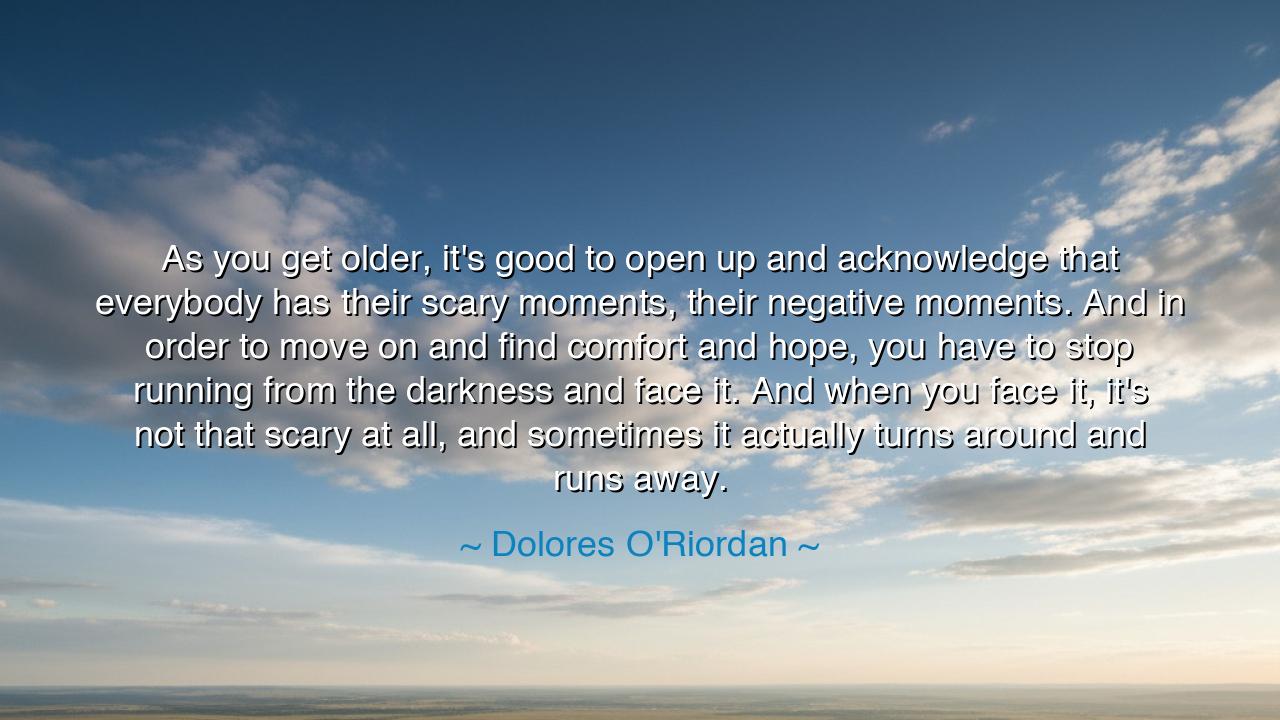
As you get older, it's good to open up and acknowledge that
As you get older, it's good to open up and acknowledge that everybody has their scary moments, their negative moments. And in order to move on and find comfort and hope, you have to stop running from the darkness and face it. And when you face it, it's not that scary at all, and sometimes it actually turns around and runs away.






The words of Dolores O’Riordan — “As you get older, it's good to open up and acknowledge that everybody has their scary moments, their negative moments. And in order to move on and find comfort and hope, you have to stop running from the darkness and face it. And when you face it, it's not that scary at all, and sometimes it actually turns around and runs away.” — carry the quiet strength of a soul who has wrestled with shadows and learned to speak their language. These are not the words of the untested, but of one who has wandered through grief, fear, and uncertainty, and returned with the treasure of understanding. O’Riordan, whose voice once shook the heavens with both sorrow and beauty, reminds us that life’s truest courage is not found in the absence of fear, but in the embrace of it.
In the wisdom of the ancients, there was a teaching that said: “The cave you fear to enter holds the treasure you seek.” This truth is the very heart of O’Riordan’s reflection. For she speaks of darkness not as an enemy to be slain, but as a teacher to be met. When we are young, we flee from our pain; we bury it beneath laughter, ambition, or silence. But as the years pass, life reveals that the only way to find comfort and hope is through the act of turning toward the things we fear most. To deny pain is to prolong it. To face it is to dissolve its power.
So it has been in every age. Buddha, in his search for enlightenment, sat beneath the Bodhi tree and was visited by Mara, the demon of illusion and fear. Mara brought visions of doubt, temptation, and death. But Buddha did not run. He touched the earth and said, “I see you.” And with that single act of recognition, Mara vanished. So it is with the demons of the mind — they thrive in denial, but fade in acknowledgment. O’Riordan’s wisdom echoes this ancient truth: when we look directly into our darkness, it ceases to rule us. Indeed, it may even “turn around and run away.”
To face one’s darkness is not an act of despair; it is an act of profound love — love for the self that deserves peace. For every heart carries its own hidden chambers: grief that has not yet found words, guilt that whispers in the night, or fear that hides behind laughter. The wise do not pretend these shadows do not exist; they invite them to speak. In this openness, healing begins. For just as the night sky reveals its stars only in darkness, so too does the soul reveal its light when we dare to look inward.
Consider the story of Nelson Mandela, imprisoned for twenty-seven years. In that long captivity, he came face to face with his anger and despair. He did not deny them; he studied them, mastered them, and transformed them into compassion. When he emerged from prison, he did not bring vengeance, but forgiveness — the kind that can only be born from one who has walked through the darkness and returned unbroken. His journey mirrors O’Riordan’s truth: that courage is not the absence of fear, but the will to stand before it and say, “You will not define me.”
As we grow older, we come to see that everyone has their scary moments, no matter how strong they seem. The warrior, the artist, the parent, the leader — all carry their silent battles. To open up about these struggles is not weakness; it is strength, for it reminds others that they, too, can survive. When we share our pain, we break its chains. And when we stand together in honesty, the darkness loses its dominion.
Let this teaching be carried forward like a torch through the ages: do not flee from your fears. Sit with them. Name them. Let them speak — and you will find that they are not monsters, but messengers. When the storm comes, do not run for shelter; lift your face to the rain, for even in the tempest there is cleansing. The heart that has faced its own night learns to walk freely in the day.
Thus, Dolores O’Riordan’s wisdom endures as both balm and commandment: that we must meet our own shadows if we wish to find light. For when we stop running, we discover that what we feared was never meant to destroy us — only to awaken us. And in that awakening, we become whole. So stand firm, dear soul, when the darkness rises. Look it in the eye, and you will see — it was never the darkness chasing you, but the dawn waiting to be born.






AAdministratorAdministrator
Welcome, honored guests. Please leave a comment, we will respond soon